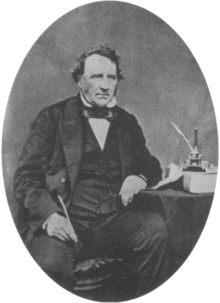
Back تشارلز پايرسون ARZ Charles Pearson Catalan Charles Pearson (Politiker) German Charles Pearson Spanish Charles Pearson Italian チャールズ・ピアソン Japanese 찰스 피어슨 Korean Charles Pearson Portuguese 查爾斯·皮爾森 Chinese
Charles Pearson | |
|---|---|
 Pearson, c. 1855 | |
| Solicitor to the City of London | |
| In office 1839–1862 | |
| Member of Parliament for Lambeth | |
| In office 31 July 1847 – July 1850 | |
| Preceded by | Benjamin Hawes |
| Succeeded by | William Williams |
| Councilman of the Corporation of London | |
| In office 1817–1820 | |
| Constituency | Bishopsgate |
| In office 1830–1836 | |
| Constituency | Bishopsgate |
| Personal details | |
| Born | 4 October 1793 City of London, England |
| Died | 14 September 1862 (aged 68) Wandsworth, England |
| Political party | Liberal |
| Other political affiliations | Radicals |
| Spouse | |
| Children | 1 |
| Occupation | Lawyer |
| Known for | Transport campaigner |
Charles Pearson (4 October 1793 – 14 September 1862) was a British lawyer and politician. He was solicitor to the City of London, a reforming campaigner, and – briefly – Liberal Party Member of Parliament for Lambeth. He campaigned against corruption in jury selection, for penal reform, for the abolition of capital punishment, and for universal suffrage.
Pearson used his influence as City Solicitor to promote improvements to transport communications. Initially, he proposed a central railway station for the City, accessed by tunnel, that would be used by multiple railway companies enabling workers to commute to the City from further away. When this plan was rejected, Pearson promoted an underground railway connecting the capital's northern termini. The resulting Metropolitan Railway was the first underground railway in the world and led to the development of the extensive London Underground network and the rapid expansion of the capital.